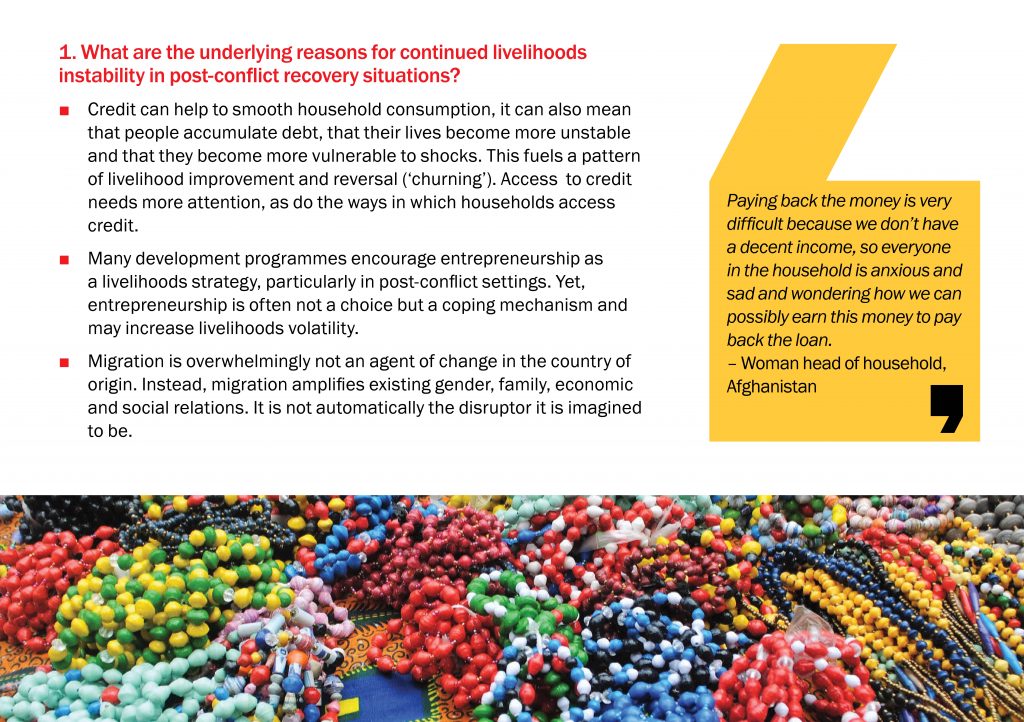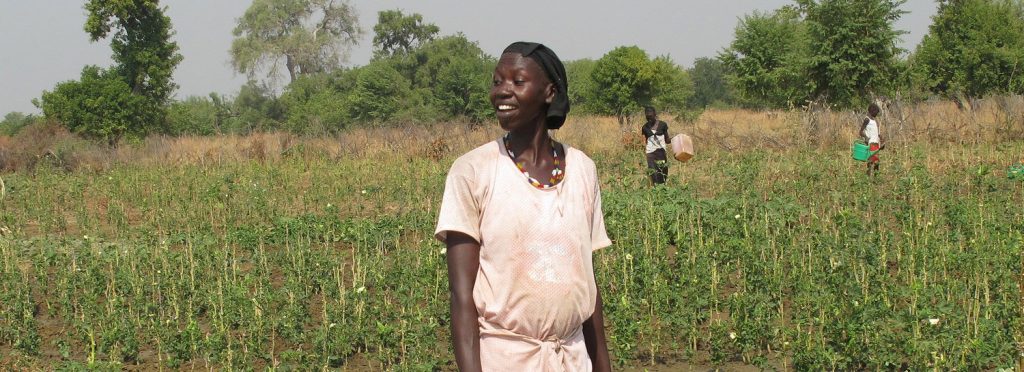
What we do
We conduct high quality empirical and qualitative research exploring livelihoods, basic services and social protection in conflict-affected situations.
SLRC Phase I: 2011 – 2017
Our first phase of research was based on three research questions. These research themes were developed over the course of an intensive one-year inception phase between 2011 and 2012. Findings from this first phase of research are summarised in five thematic research reports published in June 2017. To read these reports and to find out more about the findings from our first phase, visit our Phase I research page, here or by clicking on the image below.
State legitimacy: experiences, perceptions and expectations of the state and local governance in conflict-affected situations
Establishing, building or strengthening state legitimacy is a major element of state-building, and considered important for securing both peace and development. We explored how individuals’ experiences, perceptions and expectations of the state and local governance shape legitimacy, and attempted to identify some of the routes through which improvements in legitimacy might strengthen state-society relations.
State capacity: building effective states that deliver services and social protection in conflict-affected situations
Social protection and basic services are important in their own right. Yet, one of the standard modes of international engagement in conflict-affected environments is through programmes where the intention is to build the capacity of the state to a point where international aid actors can hand over to government authorities. There is, however, little evidence on the impacts of international attempts to build state capacity.
Livelihood trajectories and economic activity under conflict
Research under this theme asked: what do livelihood trajectories in conflict-affected situations tell us about how governments and aid agencies can more effectively support the ways in which poor and vulnerable people make a living? A major pieces of this research was the longitudinal panel survey to build a picture of how people attempt to secure their livelihoods in different contexts over time.
SLRC Phase II: 2017 – 2019
Guided by our original research questions on state legitimacy, state capacity, and livelihoods, the second phase of SLRC research delves into questions that still remain, organised into three themes of research. In addition to these themes, SLRC II also has a programme component exploring power and everyday politics in the Democratic Republic of Congo (DRC). Visit our Phase II project page for more information. Download our phase II one pager.
What are the underlying reasons for continued livelihood instability in post-conflict recovery situations?
Findings from the first phase of research showed that while diversification of livelihoods was associated with an improvement in food insecurity in some countries, the pattern was reverse in others. Our research referred to this pattern of livelihood improvement and reversal as ‘churning’.
These fairly striking rates of “churning” in levels of food insecurity in areas were still present even in areas where fighting has stopped. While diversification of livelihoods was associated with an improvement in food insecurity in some countries, the pattern was reverse in others. These findings suggest that households in conflict settings seesaw quickly between spreading of risk and development of a stronger income base, to desperation. These findings also invite us to empirically investigate the strong undercurrents of this instability.
Through what mechanisms do perceptions, definitions and experiences translate into behaviours that aids or hinders post-conflict recovery?
Phase I identified a number of seeming contradictions between people’s perceptions and behaviours and touched on a number of behavioural questions. This behaviour opens up a puzzle between what people perceive their situation to be and how they act on it. Through quantitative, qualitative, and experimental methods this theme will explore how insights into perceptions, decisions and behaviour can be used to shape policies that allow for better decision-making in conflict situations, with the aim to support communal peace-building but also constructive individual choices.
When does service delivery influence the negotiation of state legitimacy?
The findings from SLRC’s Phase I provide us with a number of insights on the link between service delivery and perceptions of government. Key findings highlighted that people’s satisfaction with services are not simply informed by access – but that it was their relation to services that mattered more. Furthermore, the findings highlighted fairness as a key factor in influencing service users’ perceptions of their experience.
This theme aims to provide greater insights into which investments in improving services are most likely to improve legitimacy or state/society relations by exploring asymmetries in the impact of service delivery and the role of perceptions of government. Case studies under this theme will seek to understand in more contextual detail the Phase I findings on service delivery and perceptions of government, and to explore the wider political economy role that services play in the construction of state legitimacy.
Power, Poverty and Politics in the DRC
Research and policy advice in the Democratic Republic of Congo (DRC) has been good at describing the dysfunctional realities of how the country is governed, but less helpful in tackling the what, why and how questions that DFID and other donors face every day.
The DRC-PPP is a two-year research programme (January 2017 –December 2018) that seeks to develop an understanding of how outside actors might try and positively influence how DRC is governed, whilst also reducing conflict and poverty.
The programme has eight projects, each with an assigned post-doctoral researcher, that look at areas such as urban governance, the extractive sector, family planning, the decoupage of the Congolese state, and livelihoods . For more information on the DRC-PPP programme, please see the DRC country page.
SLRC survey
At the heart of SLRC’s research is a longitudinal panel survey on livelihoods and access to services, which also explores experiences, perceptions and expectations of the state and local governance. Rounds take place three years apart, with the first two rounds of fieldwork completed in 2012 and 2015. The surveys are complemented by in-depth qualitative research. At the end of its first phase in 2016, the Consortium produced five reports looking back over six years of research to draw conclusions for policy and practice on conflict, violence and fragility. The 3rd wave of the panel will take place in Uganda, Nepal, and Pakistan in 2018 under SLRC’s Phase II.
For an introduction to our panel survey and findings from the last six years of SLRC research, read our briefing paper: Lessons from the SLRC panel survey.










